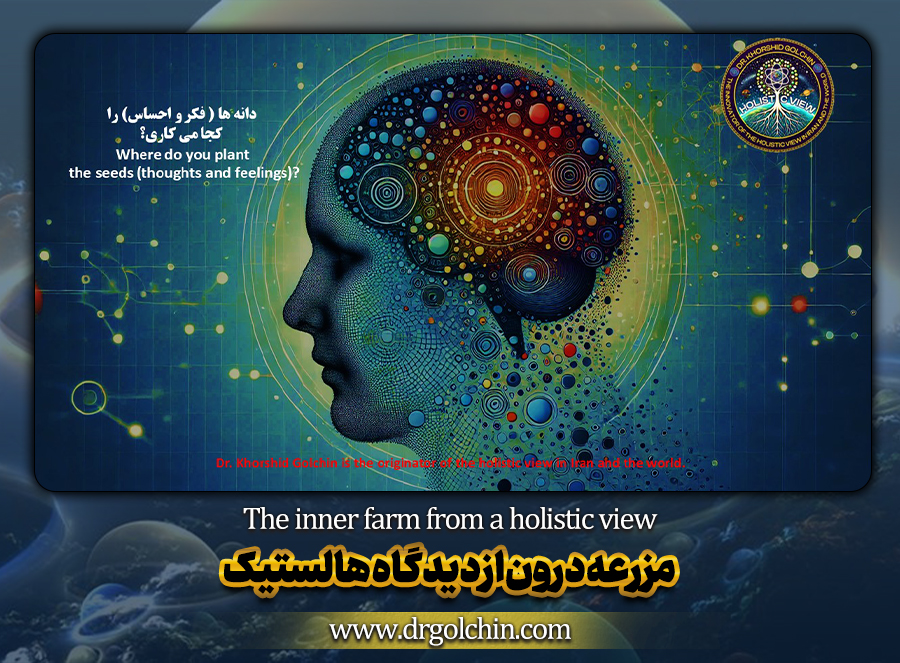مزرعه درون از دیدگاه هالستیک

بر اساس دیدگاه هالستیک من معتقدم که ، همه ی افکار و احساسات ما چه درست و چه نادرست، مانند دانه ای هستند که در مزرعه ی وجود خودمان کاشته می شوند و آبیاری می شودند و رشد می کنندو میوه می دهندو مغز ما محل آبیاری این مزرعه است . در ادامه با مقاله مزرعه درون از دیدگاه هالستیک همراه باشید .
فهرست عناوین
- تحلیل مفهوم افکار و احساسات به عنوان دانههایی در مزرعهی وجود
- چیستی این دیدگاه (مزرعه درون از دیدگاه هالستیک)
- اهمیت دیدگاه مزرعه درون از دیدگاه هالستیک
- چرا این دیدگاه مهم است؟
- چگونه این دیدگاه میتواند عملی شود؟
- مثالهایی از این دیدگاه در عمل (مزرعه درون از دیدگاه هالستیک)
- نتیجهگیری مقاله مزرعه درون از دیدگاه هالستیک
تحلیل مفهوم افکار و احساسات به عنوان دانههایی در مزرعهی وجود
مفهوم افکار و احساسات به عنوان “دانههایی” که در “مزرعهی وجود” ما کاشته میشوند و سپس توسط مغز، به عنوان محل آبیاری، رشد میکنند و به میوه میرسند، دیدگاهی استعاری و عمیق است که بر نحوه شکلگیری شخصیت، رفتارها و در نهایت زندگی ما تأکید دارد. این دیدگاه به ما یادآوری میکند که ذهن و روان ما همچون یک باغ هستند که در آن، افکار و احساسات نقش بذرهایی را دارند که بسته به نوع و کیفیتشان، میتوانند به گیاهان سالم و یا به علفهای هرز تبدیل شوند. در این تحلیل، به بررسی این موضوع از دیدگاههای مختلف و با ارائه ده مثال خواهیم پرداخت.
چیستی این دیدگاه (مزرعه درون از دیدگاه هالستیک)
این دیدگاه بیان میکند که هر فکری که در ذهن ما شکل میگیرد و هر احساسی که تجربه میکنیم، تاثیر مستقیمی بر زندگی ما دارد. به عبارت دیگر، این افکار و احساسات همچون دانههایی هستند که در ذهن و روح ما کاشته میشوند و با گذر زمان و با توجه به توجه و انرژیای که به آنها اختصاص میدهیم، رشد کرده و به نتایج مثبت یا منفی منجر میشوند. مغز ما به عنوان محل آبیاری، وظیفه تغذیه این دانهها را بر عهده دارد، به این معنا که آنچه ما به عنوان تفکر و احساس در ذهنمان پرورش میدهیم، توسط مغزمان پردازش و گسترش مییابد.
اهمیت دیدگاه مزرعه درون از دیدگاه هالستیک
این استعاره اهمیت بالایی در فهم این موضوع دارد که افکار و احساسات ما چقدر میتوانند زندگیمان را تحت تاثیر قرار دهند. در واقع، این مفهوم به ما یادآور میشود که مسئولیت افکار و احساساتمان و به تبع آن، مسئولیت رشد و توسعه شخصیتی و معنویمان بر عهده خودمان است. با توجه به این دیدگاه، میتوانیم بهتر بفهمیم که چگونه افکار منفی میتوانند به عواقب ناگواری منجر شوند، در حالی که افکار مثبت میتوانند منجر به رشد و بهبود شوند. (مزرعه درون از دیدگاه هالستیک)
چرا این دیدگاه مهم است؟
- قدرت تفکر و احساس: این دیدگاه بر این باور است که تفکر و احساسات، دو نیروی قدرتمند در زندگی انسان هستند. افکار ما به عنوان محرک اصلی اعمال و رفتارهای ما عمل میکنند و احساسات ما به عنوان موتور انگیزشی پشت این اعمال هستند.
- نقش آگاهی و هوشیاری: با پذیرش این دیدگاه، میتوان به این نتیجه رسید که آگاهی و هوشیاری نسبت به افکار و احساساتمان میتواند به ما در مدیریت بهتر زندگیمان کمک کند. به عبارت دیگر، اگر بدانیم که هر فکری که در ذهن ما شکل میگیرد میتواند به نوعی “بذر” تبدیل شود، به احتمال زیاد در انتخاب افکار و احساسات خود دقت بیشتری خواهیم داشت.
- مسئولیت شخصی: این دیدگاه تاکید دارد که هر فرد مسئول کاشت و پرورش دانههای ذهنی خود است. این بدان معناست که ما نمیتوانیم دیگران را برای افکار و احساسات خود مقصر بدانیم و باید مسئولیت کامل زندگی خود را بر عهده بگیریم.

چگونه این دیدگاه میتواند عملی شود؟
- تغییر الگوهای فکری: با توجه به این که افکار منفی میتوانند مانند علفهای هرز در مزرعه ذهن ما رشد کنند، مهم است که الگوهای فکری خود را شناسایی کرده و در صورت لزوم آنها را تغییر دهیم. این کار میتواند از طریق تمرینات خودآگاهی، مدیتیشن و مشاوره روانشناسی صورت گیرد.
- پرورش افکار مثبت: همانطور که یک کشاورز برای بهبود کیفیت محصول خود از روشهای خاصی استفاده میکند، ما نیز میتوانیم با تمرکز بر افکار مثبت و سازنده، کیفیت زندگی خود را بهبود بخشیم. این کار میتواند شامل تفکر مثبت، تجسم موفقیتها و تمرین شکرگزاری باشد.
- مدیریت احساسات: احساسات نیز همچون افکار نیاز به مدیریت و هدایت دارند. با شناخت احساسات خود و درک ریشههای آنها، میتوانیم آنها را به شکلی مثبت هدایت کنیم.

مثالهایی از این دیدگاه در عمل (مزرعه درون از دیدگاه هالستیک)
- مثال اول: تاثیر تفکر مثبت در موفقیت شغلی
فردی که به طور مداوم به موفقیت شغلی خود فکر میکند و خود را در حال انجام وظایف خود به بهترین نحو تصور میکند، احتمالاً با انگیزه و تلاش بیشتری کار خواهد کرد و در نهایت به موفقیت خواهد رسید. - مثال دوم: تاثیر احساسات منفی در روابط اجتماعی
فردی که دائماً احساسات منفی مانند خشم یا حسادت را تجربه میکند، ممکن است روابط اجتماعی خود را تحت تاثیر قرار داده و از دست بدهد، زیرا این احساسات میتوانند منجر به رفتارهای ناپسند و آسیبرسان شوند. - مثال سوم: قدرت تجسم مثبت در ورزش
ورزشکاری که قبل از مسابقه، خود را در حال پیروزی تجسم میکند و به این فکر میکند که چگونه به بهترین نحو میتواند عملکرد خود را به نمایش بگذارد، احتمالاً نتایج بهتری کسب خواهد کرد. - مثال چهارم: تاثیر تفکر منفی در سلامت جسمی
فردی که دائماً به بیماریها و مشکلات جسمی فکر میکند و نگران است، ممکن است سیستم ایمنی بدنش ضعیفتر شود و واقعاً به مشکلات جسمی دچار شود. این مسئله به عنوان اثر دارونما (پلاسیبو) نیز شناخته میشود. - مثال پنجم: استفاده از تفکر مثبت در مدیریت استرس
فردی که در مواجهه با موقعیتهای استرسزا از تفکر مثبت استفاده میکند و به جای تمرکز بر مشکلات، به راهحلها و فرصتها فکر میکند، احتمالاً استرس کمتری را تجربه خواهد کرد. - مثال ششم: تاثیر افکار مثبت در بهبود روابط عاطفی
فردی که در روابط عاطفی خود به طور مداوم به نقاط قوت شریک زندگیاش فکر میکند و از ابراز محبت و قدردانی غافل نمیشود، احتمالاً روابطی پایدارتر و شادتر خواهد داشت. - مثال هفتم: نقش احساسات مثبت در افزایش خلاقیت
فردی که خود را در یک حالت احساسی مثبت قرار میدهد، میتواند خلاقتر شود. تحقیقات نشان میدهند که احساسات مثبت میتوانند باعث گسترش دیدگاه فرد و افزایش توانایی حل مسئله شوند. - مثال هشتم: تاثیر تمرکز بر افکار سازنده در دستیابی به اهداف مالی
فردی که به طور مداوم به موفقیت مالی فکر میکند و از تصویرسازی ذهنی برای دستیابی به اهداف مالی خود استفاده میکند، ممکن است با ایجاد برنامههای مالی دقیقتر و کارآمدتر به اهداف خود نزدیکتر شود. - مثال نهم: تاثیر تفکر منفی در جلوگیری از پیشرفت شخصی
فردی که دائماً به ناکامیهای گذشته خود فکر میکند و از شکستهای خود درس نمیگیرد، ممکن است از پیشرفت شخصی خود باز بماند و به خودباوری منفی دچار شود. - مثال دهم: نقش احساسات مثبت در بهبود سلامت روان
فردی که به طور منظم احساسات مثبت مانند شکرگزاری، محبت و عشق را تجربه میکند، احتمالاً سلامت روان بهتری خواهد داشت و کمتر به مشکلاتی مانند افسردگی و اضطراب دچار خواهد شد.

نتیجهگیری مقاله مزرعه درون از دیدگاه هالستیک
این دیدگاه که “همهی افکار و احساسات ما، چه درست و چه نادرست، مانند دانهای هستند که در مزرعهی وجود خودمان کاشته میشوند و آبیاری میشوند و رشد میکنند و میوه میدهند” به ما یادآوری میکند که ما کنترل کامل بر افکار و احساسات خود داریم و با توجه به آنها میتوانیم زندگیای پرمعنا، سالم و موفق داشته باشیم. با توجه به این مفهوم، هر فردی میتواند با تمرکز بر افکار و احساسات مثبت و مدیریت الگوهای منفی، کیفیت زندگی خود را بهبود بخشد و به اهداف خود نزدیکتر شود. (مزرعه درون از دیدگاه هالستیک)
Based on the holistic view, I believe that all our thoughts and feelings, whether right or wrong, are like seeds that are planted in the field of our existence, watered, and grow and bear fruit, and our brain is the watering place of this field. is
Analysis of the Concept: Thoughts and Emotions as Seeds in the Field of Our Existence
The metaphor of thoughts and emotions as “seeds” planted in the “field of our existence” that are nurtured by the brain, grow, and eventually bear fruit, is a profound and holistic perspective on how our personalities, behaviors, and ultimately, our lives are shaped. This view reminds us that our mind and psyche are like a garden, where thoughts and emotions act as seeds that, depending on their nature and quality, can grow into healthy plants or become weeds. In this analysis, we will explore this concept from different perspectives, using the questions “What?”, “Why?”, “How?”, and “Examples”, and provide ten specific examples to illustrate this metaphor.
What Is This View?
This view suggests that every thought that forms in our mind and every emotion we experience directly impacts our lives. In other words, these thoughts and emotions are like seeds planted in our minds and souls, which grow and lead to positive or negative outcomes depending on the attention and energy we give them. Our brain, as the watering place, is responsible for nurturing these seeds, meaning that what we cultivate as thoughts and feelings in our minds is processed and expanded by our brains.
Importance of the View
This metaphor is significant in understanding how much thoughts and emotions can affect our lives. Essentially, it reminds us that we are responsible for our thoughts and feelings and, consequently, responsible for the growth and development of our personality and spiritual life. By considering this perspective, we can better understand how negative thoughts can lead to adverse outcomes, while positive thoughts can result in growth and improvement.
Why Is This View Important?
- Power of Thoughts and Emotions: This perspective asserts that thoughts and emotions are two powerful forces in human life. Our thoughts act as the primary drivers of our actions and behaviors, while our emotions serve as the motivational engine behind these actions.
- Role of Awareness and Consciousness: Embracing this view helps us understand that awareness and consciousness of our thoughts and emotions can aid in better managing our lives. In other words, if we know that every thought that forms in our minds can turn into a “seed,” we are likely to be more careful in choosing our thoughts and emotions.
- Personal Responsibility: This perspective emphasizes that each person is responsible for planting and nurturing their mental seeds. This means we cannot blame others for our thoughts and feelings and must take full responsibility for our lives.
How Can This View Be Applied?
- Changing Thought Patterns: Given that negative thoughts can grow like weeds in the garden of our minds, it is essential to identify our thought patterns and change them if necessary. This can be achieved through self-awareness practices, meditation, and psychological counseling.
- Cultivating Positive Thoughts: Just as a farmer uses specific methods to improve the quality of their crops, we can improve our lives’ quality by focusing on positive and constructive thoughts. This can include positive thinking, visualizing success, and practicing gratitude.
- Managing Emotions: Emotions, like thoughts, need to be managed and directed. By recognizing our emotions and understanding their roots, we can guide them positively.
Examples of This View in Practice
- Example 1: The Impact of Positive Thinking on Career Success
A person who constantly thinks about their career success and envisions themselves performing their tasks excellently is likely to work with more motivation and effort and ultimately achieve success. - Example 2: The Impact of Negative Emotions on Social Relationships
A person who continually experiences negative emotions such as anger or jealousy may adversely affect their social relationships, leading to loss, as these emotions can result in undesirable and harmful behaviors. - Example 3: The Power of Positive Visualization in Sports
An athlete who visualizes winning before a competition and thinks about how best to perform is likely to achieve better results. - Example 4: The Impact of Negative Thinking on Physical Health
A person who constantly worries about illnesses and physical problems may weaken their immune system and develop physical issues. This phenomenon is also known as the placebo effect. - Example 5: Using Positive Thinking to Manage Stress
A person who uses positive thinking when facing stressful situations and focuses on solutions and opportunities instead of problems is likely to experience less stress. - Example 6: The Impact of Positive Thoughts on Improving Emotional Relationships
A person who consistently thinks about the strengths of their partner in a relationship and does not hesitate to express love and appreciation will likely have more stable and happier relationships. - Example 7: The Role of Positive Emotions in Increasing Creativity
A person who places themselves in a positive emotional state can become more creative. Research shows that positive emotions can broaden a person’s perspective and increase their problem-solving abilities. - Example 8: The Impact of Focusing on Constructive Thoughts on Achieving Financial Goals
A person who continually thinks about financial success and uses mental imagery to achieve their financial goals may come closer to achieving their goals by developing more precise and efficient financial plans. - Example 9: The Impact of Negative Thinking on Preventing Personal Growth
A person who constantly dwells on past failures and does not learn from them may hinder their personal growth and develop negative self-beliefs. - Example 10: The Role of Positive Emotions in Improving Mental Health
A person who regularly experiences positive emotions such as gratitude, affection, and love is likely to have better mental health and be less prone to issues like depression and anxiety.
Conclusion (The inner farm from a holistic perspective)
The view that “all our thoughts and emotions, whether right or wrong, are like seeds planted in the field of our existence, nurtured and grown, and bear fruit” reminds us that we have full control over our thoughts and emotions and that by paying attention to them, we can lead a meaningful, healthy, and successful life. According to this concept, each person can improve their quality of life by focusing on positive thoughts and emotions and managing negative patterns, bringing them closer to their goals.





